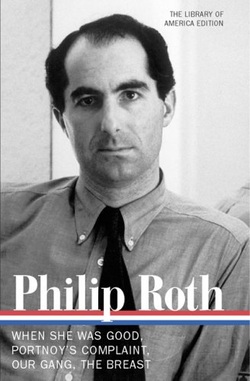
James Wood, writing about 2007’s Exit Ghost, called Roth “the great stealth postmodernist of American letters,” which is fitting. We don’t often lump Roth in the post-modern camp because, on a sentence level, he does not consciously seek to dazzle. His first book, the National Book Award-winning story collection Goodbye Columbus, was published three years before Nabokov’s Pale Fire. He comes from that last generation before Barthelme and Pynchon.
As Wood says,
“Roth has been the great stealth postmodernist of American letters, able to have his cake and eat it without any evidence of crumbs. This is because he does not regard himself as a postmodernist. He is intensely interested in fabrication, in the performance of the self, in the reality that we make up in order to live; but his fiction examines this ‘without sacrificing the factuality of time and place to surreal fakery or magic-realist gimmickry,’ as [Roth’s character, Nathan] Zuckerman approvingly says of [another writer’s] work. Roth does not want to use his games to remind us, tediously and self-consciously, that [his characters] are just ‘invented characters.’
[Implicit in Wood’s assessment is idea that razzle-dazzle sentences and “magic-realist gimmickry” necessarily lead to the creation of characters that readers do not perceive as being “real.”]
While Roth’s sentences don’t call attention to themselves, I have long admired him for his paragraphs. Especially when detailing past incidents, he can crunch so much into his paragraphs. Multiple speakers. Multiple lines of dialogue. Multiple actions. Yet always there is enough of a connecting narrative thread to pull the reader along.
I was reminded of Roth’s paragraphs again when reading Portnoy’s Complaint last week for the first time. To be honest, the novel as a whole disappointed me, but some of the paragraphs floored me.
Here’s one in which the young Alexander Portnoy recalls his father arguing with his mother while leaving his house one morning to go to work:
“Talk?” he cries. “It’s the truth,” and in the very next instant is thomping angrily around the house hollering, “My hat, I’m late, where’s my hat? who saw my hat?” and my mother comes into the kitchen and gives me her patient, eternal all-knowing sphinx-look… and waits… and soon he is back in the hallway, apoplectic and moaning, practically in grief, “Where is my hat? Where is that hat!” until softly, from the depths of her omniscient soul, she answers him, “Dummy, it’s on your head.” Momentarily his eyes seem to empty of all signs of human experience and understanding; he stands there, a blank, a thing, a body full of [excrement] and no more. Then consciousness returns—yes, he will have to go out into the world after all, for his hat has been found, on his head of all places. “Oh, yeah,” he says, reaching up in wonderment—and then out of the house and into the [car], and [he] is gone until dark.”
Is that a paragraph or what?
In the later Zuckerman books, especially in the American Trilogy (American Pastoral, I Married A Communist, The Human Stain), the paragraphs get even better. And longer. And still you wish they’d never end.
As some of you know, I’ve been working on a new novel, which I hope to finish by sometime in September. In it, I’ve been trying to write Roth-like paragraphs incorporating the multiple speakers and multiple acts. This is something of a stretch for me, but it’s going well and I’m having a lot of fun writing it.
Falco Errata: Recently, I wrote about Ed Falco’s Burning Man collection. I neglected to mention that he’s also the man responsible for the forthcoming Godfather sequel. Here’s an interview he gave to The Roanoke Times last month about that project.
Tallman Errata: BLIP’s summer issue included a short-short by my friend Jenniey Tallman. Check it out here. She also has work forthcoming in Gargoyle soon. But BLIP is so good. They’ve also got work up by Jessica Hollander, Kim Chinquee, and Alan Michael Parker, among others.
Blackwell Errata: Check out Gabriel Blackwell’s hypertext-y “Neverland,” now up at Uncanny Valley. It’s a really fun piece, so be prepared to spend some time there. Or, better yet, make multiple visits.
 RSS Feed
RSS Feed
